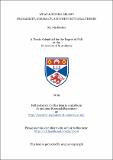What justifies belief? : probability, normalcy, and the functional theory
View/
Date
24/06/2019Author
Metadata
Show full item recordAltmetrics Handle Statistics
Altmetrics DOI Statistics
Abstract
‘What justifies belief?’ This question is arguably one of the most important questions
in contemporary epistemology. The first part of this study looks at two very different
answers to the above question, but ultimately finds both of them wanting. According
to probabilistic accounts of justification, the property that makes a belief justified is
some property along the lines of being highly probable. I call this picture of
justification the Lockean View. In contrast, according to the most prominent non-
probabilistic accounts of justification, the property that justifies belief is some
property along the lines of being true in all normal worlds. I call this non-probabilistic
picture of justification the Normalcy View. However, as we will see, both families of
views turn out to be problematic. While probabilistic accounts are incompatible with
an attractive principle called multi premise closure (MPC), non-probabilistic
accounts, I argue, are too demanding and therefore too stingy. This leaves us in a
dilemma; neither probabilistic nor non-probabilistic accounts of justification seem to
be wholly satisfactory. I call this the (MPC)-Stinginess Dilemma.
The second part of this study is concerned with how we should respond to this
dilemma. After considering but rejecting some initial options, I argue that the dilemma
can be avoided if we reject the almost universally accepted monist assumption that
there is only one way for a belief to be justified; or, that there is only one property that
can make a belief justified. Subsequently I develop and defend a novel, pluralist,
theory of epistemic justification. I call it the Functional Theory of Justification. One
upshot of the functional theory is that it makes room for the idea that there is more
than one way for a belief to be justified; or, more precisely, that depending on our
epistemic environment, justification can be realized by different properties.
Type
Thesis, PhD Doctor of Philosophy
Collections
Items in the St Andrews Research Repository are protected by copyright, with all rights reserved, unless otherwise indicated.

